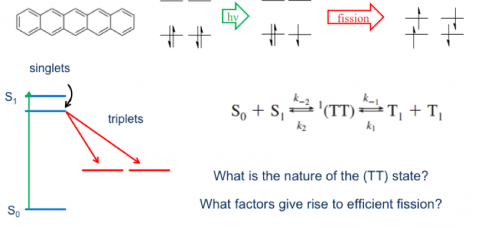 In pursuit of viable sustainable energy sources, there has been much progress due to advances in engineering and infrastructure. However, because existing technologies contain certain intrinsic limitations, there are also large potential gains through the discovery of new physics. My work is centered on the elucidation of the mechanism for singlet fission in polycrystalline organic materials. Singlet fission is the process by which a chromophore in a singlet excited state gives rise to a pair of triplets with opposite spin. By dissociating these triplets in a suitable device, we may be able to generate multiple charge carriers from a single photoexcitation. Such a process is important, because it would open the possibility that a low-cost photovoltaic cell could achieve power conversion efficiencies higher than the fundamental limits of simple silicon or thin film cells currently in production. I aim to study the materials properties that give rise to efficient fission using experimental techniques pioneered here in the Optoelectronics Group at the Cavendish Laboratory.
In pursuit of viable sustainable energy sources, there has been much progress due to advances in engineering and infrastructure. However, because existing technologies contain certain intrinsic limitations, there are also large potential gains through the discovery of new physics. My work is centered on the elucidation of the mechanism for singlet fission in polycrystalline organic materials. Singlet fission is the process by which a chromophore in a singlet excited state gives rise to a pair of triplets with opposite spin. By dissociating these triplets in a suitable device, we may be able to generate multiple charge carriers from a single photoexcitation. Such a process is important, because it would open the possibility that a low-cost photovoltaic cell could achieve power conversion efficiencies higher than the fundamental limits of simple silicon or thin film cells currently in production. I aim to study the materials properties that give rise to efficient fission using experimental techniques pioneered here in the Optoelectronics Group at the Cavendish Laboratory.

